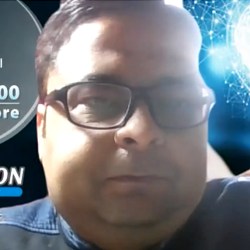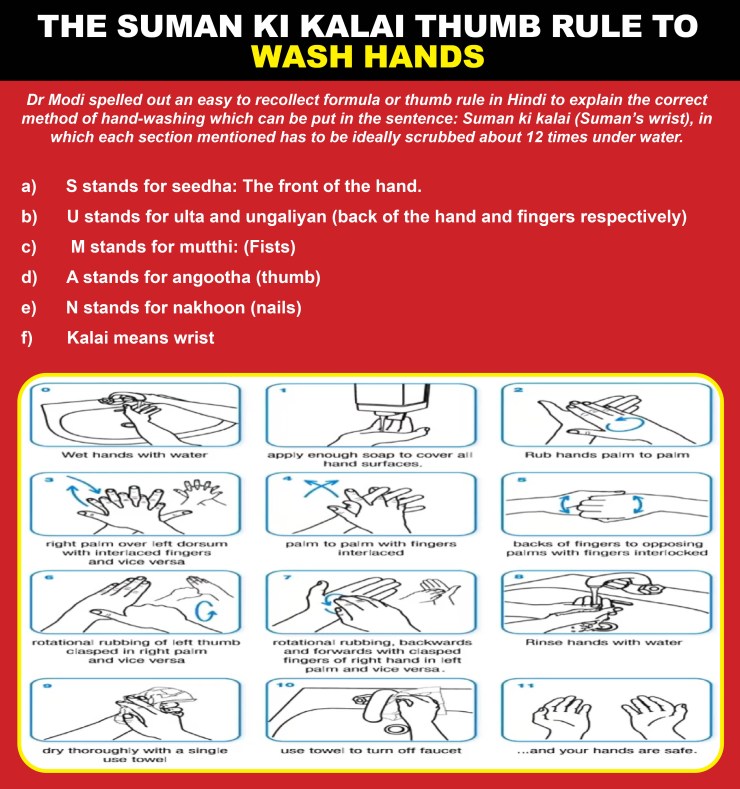Covid-19
Are we moving from pandemic to endemic? Not quite, says Covid-care expert Dr Nikhil Modi
The good doctor busted common myths around the Omicron virus and other queries related to the third wave in a webinar organised by Walter Bushnell
Share this story:
Published
2 years agoon

A webinar on the topic ‘Are we moving from pandemic to endemic? Is this the end?’ was organised recently by Walter Bushnell. The distinguished speaker was Dr Nikhil Modi, consultant, department of respiratory, critical care and sleep medicine, Indraprastha Apollo Hospital, New Delhi. Dr Modi is a core member of the hospital’s Covid-19 pulmonary care unit with more than 12 years of experience in the field of respiratory medicine and critical care.

The other participants in the webinar included Walter Bushnell General Manager (sales and marketing) Vikram Narang, Dr Manju Purohit, head medical department for Walter Bushnell and Miss Anjana Nath, Chief People Officer, Apeejay Education Society.
After a brief introduction by Sachin Kapoor, deputy general manager (HR), Dr Modi went on to deliver an exhaustive and informative talk on the topic, narrated in a simple, easy-to-recollect manner. He also demystified several commonly held misconceptions about the Omicron variant and queries relating to the third wave of the worldwide Covid-19 pandemic.

Setting the tone for the webinar, Mr Sachin Kapoor said, “Is Omicron the last variant of concern? Or are we moving towards the end of the pandemic? This is the primary question on the minds of most of us. The purpose of this webinar is to help us cope emotionally with the present situation, which is causing a sense of fear, worry and uncertainty among us,” he explained.
Welcoming the main speaker, Dr Manju Purohit said: “Dr Modi has vast experience in dealing with all types of respiratory ailments including sleep disorders with extensive exposure of fibre-optic bronchoscopy and other chest-related procedures and managing all types of critically ill patients. The overall pattern of the Coronavirus pandemic so far has been waves of Covid-19 with surges in new cases followed by decline. To help us understand the implications of Covid-19 during this third wave and more importantly, best practices, precautions to be followed, we have with us Dr Nikhil Modi. He will discuss the current situation and also tell us as to where we are moving.”

Dr Modi began his talk by striking a note of caution. “Covid has been the hot topic of discussion for the past two years. The third wave is a milder wave and there is talk of an end to the pandemic, but I would still say, we need to be cautious. This virus keeps on mutating. So whether the next virus will morph into a weaker one in the endemic stage or another surge of infection awaits us, is not yet clear. So please don’t be complacent. Even after the second wave we became complacent and thought there would be no third wave. But here we are in the third wave and even those who are vaccinated and had Covid in the past are again getting infected.”

Dr Modi said that as a society, we must revisit the lessons learnt from the first and second Covid wave. “The hand sanitisation practices, masking up and social distancing that we had been following had somewhere gone missing. So, we must return to the basics and start following them,” is his recommendation.
Elaborating upon the Omicron virus, he said that it had mutated significantly. “The Omicron variant distinguishes itself from previous variants by harbouring almost 49 mutations in its genomic sequence (35 of which occur within the spike protein). The virus on its surface has a spike-like protein by which it attaches itself to our body and goes inside and evades the previously caused immunity even for those infected by the Covid Virus in the past. With as many as 35 mutations in spike proteins, the Omicron virus is predicted to be twice as infectious as the Delta variant. The silver lining is that it only causes mild illness in 99% of cases. But still, we can’t be complacent.”
The highly infectious nature of Omicron is worrying, said Dr Modi. “Even if the mortality rate of Omicron is .2 per cent, we are still getting 3.5 lakh cases a day in India. In case this persists for another few weeks, we are looking at one crore individuals affected within a month. And from this .2 per cent are dying, that makes a significant number of 20,000 deaths. That’s why we can’t be complacent thinking that it is a mild form,” he explained. “Nobody predicted the arrival of Omicron after the Delta variant. Similarly, there may be a new wave ahead after Omicron with a more severe form of the mutation. So, I cannot say it is the end of the pandemic just now. Definitely, with increasing immunity due to Omicron, plus the vaccines, we may be heading to the end. But saying that it is the end will be a very wrong statement and three months down, we might be in trouble if we believe that.”
Panacea for Omicron: The golden trinity
According to Dr Modi, the three-pronged strategy for prevention of Omicron continues to be hand hygiene, respiratory hygiene and social distancing. “We know all these but we tend to forget them. We must focus on our diet and mental health. With the highly contagious and asymptomatic nature of omicron, there is a likelihood that one may get infected. If our immunity is good we may be able to stay protected and for this a healthy diet rich in yellow fruits and green, leafy vegetables becomes really critical. Vitamin C rich food such as aamla and oranges goes a long way in providing our body antioxidants and vitamins which are important to build our immunity,” recommended Dr Modi.
Pay attention to your mental health
The disease has been stigmatised so much that Facebook and WhatsApp are full of rumours, said Dr Modi. “A lot of patients come to us with complaints of anxiety and depression and this combination weakens their immunity to fight the infection as well. So I would urge everybody to focus on their mental health. Try to relax with indoor games and think positive. Together we can beat this virus. We have already done that in the first two waves and we are already doing a good job in the third wave.”
A shot in the arm
Dr Modi strongly recommended getting children aged between 15 years and 18 years vaccinated. “The safety data is reassuring for adults and more so for children. Our vaccines are perfectly safe and help reduce the risk of hospitalisation and incidence of multi-system inflammatory disease in children which is the most dangerous form for them. Even the long Covid symptoms are reduced if you are vaccinated. Almost 80 lakhs children between the ages of 12 and 17 are already vaccinated in the United States and another 20 lakh have received one dose. These children are doing well.”
The biggest take-home learning and insight from the webinar? According to Dr Modi, India still needs to be cautious towards this new threat of Omicron. “We need to see more people wearing masks as we used to do in pre-Omicron times. The Covid pandemic is still not over. It might be heading to the end, it is certainly not over. This virus can still change its behaviour and new variants are evading pre-existing immunity. A new virus can still come into play. So we need to take utmost precaution in times to come, avoid large gatherings indoors and exercise restraint for some more time.”
On the question of when India will reach herd immunity, and whether that means we have reached the end of the pandemic, Dr Modi said: “When a certain percentage of population that has either got an infection in the past or has got vaccinated, they provide a barrier of spread of infection to others who have not been vaccinated or infected. This is called herd immunity. With the new Omicron strain, even those who have got vaccinated can still transmit the infection albeit with mild symptoms. The concept of herd immunity has just now been modified. We are now looking at 85 to 90 per cent people being vaccinated or infected for the others to be protected.
At the end of the day, it boils down to shoring up your immunity, recommended Dr Modi. “Build your immunity, so that even if you fall ill, you are well-equipped to fight the virus. Even 30 minutes of a brisk walk goes a long way in building our immunity since it increases circulation. Also, eight hours of good sleep is extremely crucial. This is a time when our body is at rest and our immune responses are developing at its best. So, please focus on good sleep,” he recommended.

Share this story:
Related Stories
Aasheesh Sharma is a seasoned journalist with an experience of more than 25 years spread over newspapers, news agencies, magazines and television. He has worked in leadership positions in media groups such as Hindustan Times, India Today, Times of India, NDTV, UNI and IANS. He is a published author and his essay on the longest train journey in India was included in an anthology of writings on the railways, brought out by Rupa Publications. As the Editor of Apeejay Newsroom, he is responsible for coverage of the latest news and developments in the Apeejay institutions. He can be reached at [email protected]. He tweets @Aasheesh74

The Musical Interview with Anamika Jha

CIOs prioritise AI integration amid challenges

‘My daughter loves going to this school every day’

Morachi Chincholi: Maharashtra’s hidden avian sanctuary

Student Achiever: Gold medal triumph in Science sets new standards

Experts, students discuss importance of bibliometric analysis & its impact on research

This Apeejay Noida topper didn’t let Covid, father’s death, keep him down

On YouTube, content is king, says Sanvi Narula, a 13-year-old YouTuber

Delhi girl reveals deep, dark secrets of wildlife photography

Number of hours isn’t important, staying focused is, recommends Apeejay Noida class 10 topper

VIDEO: Alumni Outreach: Sudha Mahajan, General Manager and Partner, Microsoft

From Skies to Skills: Apeejay Stya University empowers students with drone training

Apeejay’s Dwarka campus unleashes creativity at grand annual fest “Synergy 2024”

Apeejay celebrates the incredible journey of Mrs Sushma Paul Berlia on her birthday

Celebrating Chairperson Mrs Sushma Paul Berlia’s Birthday: A day full of gratitude and renewed enthusiasm

Apeejay’s IB school celebrates the visionary leadership of Mrs Sushma Paul Berlia
Trending
-

 Achievements3 years ago
Achievements3 years agoThis Apeejay Noida topper didn’t let Covid, father’s death, keep him down
-

 Interviews3 years ago
Interviews3 years agoOn YouTube, content is king, says Sanvi Narula, a 13-year-old YouTuber
-

 Alumni Speak3 years ago
Alumni Speak3 years agoDelhi girl reveals deep, dark secrets of wildlife photography
-

 Achievements3 years ago
Achievements3 years agoNumber of hours isn’t important, staying focused is, recommends Apeejay Noida class 10 topper
-

 News Pick3 years ago
News Pick3 years agoVIDEO: Alumni Outreach: Sudha Mahajan, General Manager and Partner, Microsoft
-

 Talent Treasure2 years ago
Talent Treasure2 years ago‘Beauty of nature’: Poem by Manya Das, Apeejay School, Kharghar
-

 Achievements3 years ago
Achievements3 years agoApeejay, Saket students rise and shine in class 12 Boards
-

 Achievements3 years ago
Achievements3 years agoApeejay Pitampura toppers soar high in class 12 CBSE exams